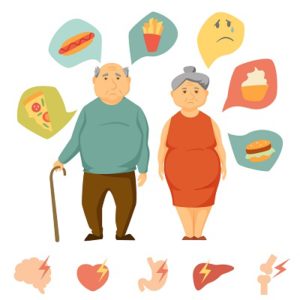 A person who eats a steady diet of junk food is said to have an unhealthy diet. Since the human body is much like a car engine, if, instead of, unleaded gasoline which the car engine was built to run on, you put in diesel fuel, the car will cough, sputter, and run badly until its early demise on the side of the road somewhere.
A person who eats a steady diet of junk food is said to have an unhealthy diet. Since the human body is much like a car engine, if, instead of, unleaded gasoline which the car engine was built to run on, you put in diesel fuel, the car will cough, sputter, and run badly until its early demise on the side of the road somewhere.
The same thing can happen to your body, as it was built to nutrients obtained from whole food and not on junk food that is loaded with empty calories, fat and has little or no nutritional value.
What is Junk Food?
Junk food is any pre-packaged and processed food that is rich in salt, sugar and calories, but, low in nutrients, vitamins and minerals. This is what most people eat as a staple these days.
What results is systematic starvation of our bodies at a cellular level. We are often overweight and our stomachs feel full, but our cells do not receive the nutrients, vitamins and minerals they desperately need to work efficiently, repair, regenerate and fight disease and infection.
3 Consequences of Eating Too Much Junk Food
1 – Obesity
The first consequence of an unhealthy diet is obesity. Since pre-processed and ready-to-eat food contains a lot of fat and sugar, we tend to plump up when our diet is heavy on processed foods. Obesity triggers a lot of negative health consequences. For one, the fat layers that we store around our middle usually also envelops our organs. This is called visceral fat.
The fat in our blood, in and around our organs and around our middle make us sluggish and low in energy. So we feel easily tired.
The fat also affects the endocrine system. It stifles and/or increases the body’s production of hormones.
2 – Hormonal Imbalance
This brings us to the second consequence of having an unhealthy diet – hormonal imbalance. Any imbalance in the secretion of hormones affects mood, energy levels, temperament and the subtle working of our organs. Is it any wonder, then, that there is an increase in the prevalence and incidence of depression, anxiety and substance abuse?
Hormones affect the way our heart behaves, literally. Our heart rate, our breathing rate, the speed at which we digest our food are all triggered and run by our hormones.
So if the hormonal balance goes out of balance, we experience a rise in our blood pressure, our heart rate and we have difficulty digesting and absorbing the food we eat. Even our sleeping and waking patterns are dictated in part by hormonal levels in our brains.
3 – Disease
The third consequence of having an unhealthy diet is an increased risk of developing lifestyle diseases. You may have heard how the so called “lifestyle” diseases are also on the rise. People as young as 25 experience their first heart attack or stroke. They get diagnosed with diabetes, gall stones, kidney stones, asthma, hypertension and other autoimmune diseases.
Autoimmune diseases are those where the body’s defences attack its own healthy cells. Examples of autoimmune diseases are multiple sclerosis, rheumatism and lupus erythematosus.
Research evidence will confirm much later on whether the prevalence of diseases in our society can be attributed in large part to our unhealthy diet. One thing is sure –we are what we eat. When we eat junk, we become the junk we eat, sooner or later.






